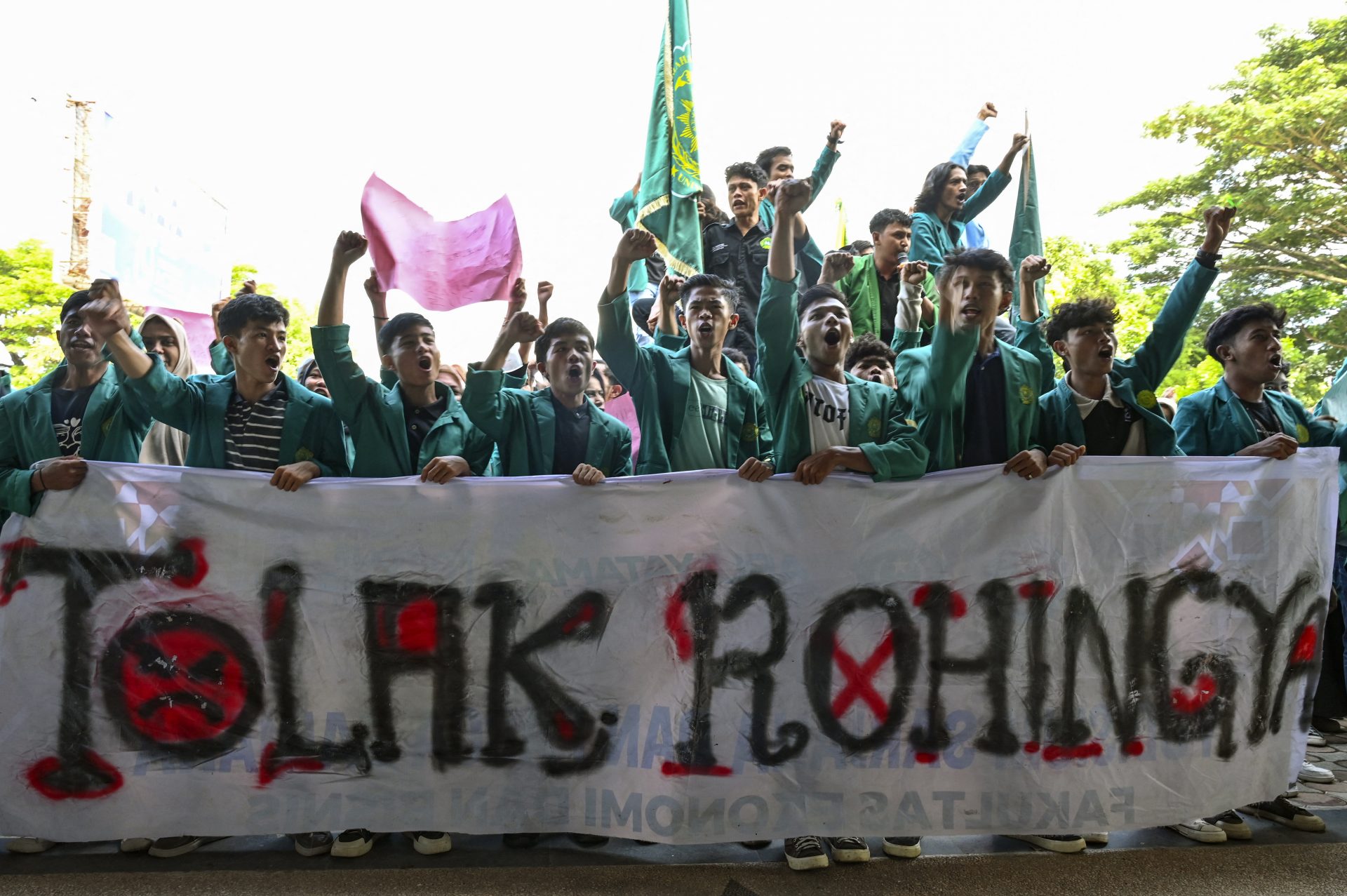Hundreds of students stormed a temporary shelter for Rohingya in Indonesia’s western Aceh province on Wednesday demanding they be deported, in an escalation of the campaign against the refugees, a U.N. agency and local media reported.
The protesters then evicted the 137 shaken-up and distressed refugees from their basement shelter, forced them onto two trucks, and transported them to another location, the U.N. refugee agency, or UNHCR, said.
The agency said it was “deeply disturbed to see a mob attack on a site sheltering vulnerable refugee families,” adding that many in the group were children and women.
“Hundreds of youngsters stormed a building basement on Wednesday where refugees were sheltered,” UNHCR said in a statement.
“The mob broke a police cordon and forcibly put 137 refugees on two trucks, and moved them to another location in Banda Aceh. The incident has left refugees shocked and traumatized.”
While the students were roughing up the Rohingya and creating mayhem at the shelter, most of the refugees either looked shell-shocked or were sobbing uncontrollably, video footage shot by Agence France-Presse news agency showed.
All the while, the protesters were shouting slogans such as “kick them out” and “reject Rohingya in Aceh,” an AFP report said.
The refugee agency said it “remains deeply worried about the safety of refugees.”
It called on local law enforcement authorities to take urgent action to ensure the Rohingya and humanitarian staff are protected.
Indonesia has a history of welcoming the Rohingya, Myanmar’s persecuted Muslim minority, and has traditionally been a supporter of the Rohingya cause.
Most of the Rohingya who arrived in Aceh have left crowded and violent refugee camps in Myanmar’s neighbor, Bangladesh, where 740,000 of them have been sheltering since they faced a brutal crackdown by the Burmese military in 2017.

However, as hundreds of Rohingya began to arrive in boats on Aceh’s shores starting mid-November, the province’s villagers grew testy, first rejecting a vessel and then demanding the refugees be sent back. More than 1,500 Rohingya have arrived since last month.
Villagers claimed that resources were already scarce for the locals, while some said they had unpleasant experiences with the Rohingya who had arrived previously and were “troublesome.”
Small protests then made way for online campaigns against the Rohingya, with Indonesians accusing the refugees of being colonizers and demanding their deportation, authorities said in recent weeks.
The campaign against the Rohingya was fueled by misinformation and propaganda on social media platforms such as X (formerly Twitter) and TikTok, where fake accounts and anti-refugee posts have gone viral.
Following Wednesday’s incident, however, the refugees found some support on X.
Herriy Cahyadi, an Indonesian who runs his own humanitarian NGO, lambasted the university students who participated in Wednesday’s incident as “barbarians” in a post on X.
“What’s the difference between you and the uneducated, violent group? Your alma mater is a symbol of higher education. But your mentality is savage,” Herriy, posting under @herricahyadi, said.
His comment had been liked by more than 4,400 people on X, and was reposted or cited more than 3,200 times by late Wednesday.

UNHCR said that it wished to emphasize that the Rohingya refugees seeking shelter in Indonesia are victims of persecution and conflict, and survivors of often deadly sea journeys.
The U.N. agency was referring to the rickety vessels that ferry the Rohingya to Southeast Asia, sometimes taking as long as two months. In January, the agency said that at least 348 individuals died or went missing at sea in 2022.
“The U.N. refugee agency is also alerting the general public to be aware of the coordinated and well-choreographed online campaign on social media platforms, attacking authorities, local communities, refugees and humanitarian workers alike, inciting hate and putting lives in danger,” the UNHCR statement said.
“UNHCR appeals to the public in Indonesia to cross-check information posted online, much of it false or twisted, with AI-generated images and hate speech being sent from bot accounts.”
Indonesian President Joko “Jokowi” Widodo, meanwhile, said earlier this month that the government would provide temporary humanitarian assistance to the refugees while prioritizing the local community’s interests.
The government plans to coordinate with the UNHCR and other international organizations to address the issue, he said.

Indonesia’s top diplomat, Retno Martsudi, took a plea on the Rohingya to Geneva, where she urged the UNHCR to find third countries for resettling the refugees.
In a meeting Dec. 11 with Filippo Grandi, the U.N. high commissioner for refugees who heads UNHCR, Retno emphasized the need for a collective approach to the refugee crisis.
The Southeast Asian nation is not a signatory to the 1951 Refugee Convention, but has a long history of hosting refugees from various conflicts. It allows refugees to stay temporarily, while they wait for a third country to resettle them, a process that can take years.
But advocates for refugee rights say that Indonesia is bound by the principle of non-refoulement, which prohibits the forced return of refugees to their home countries.







